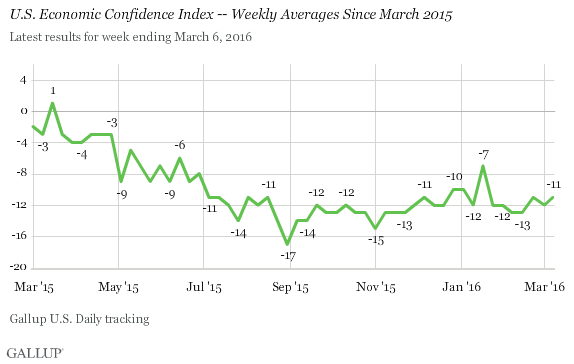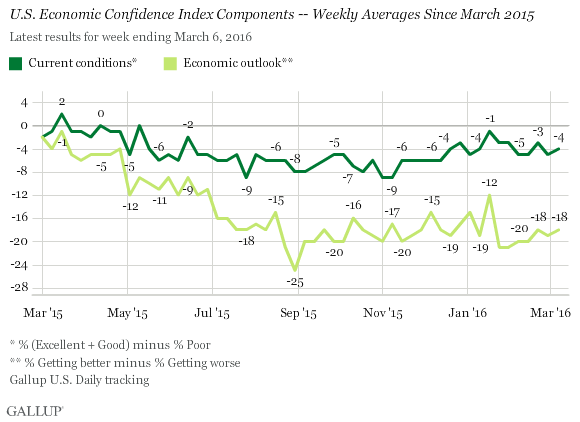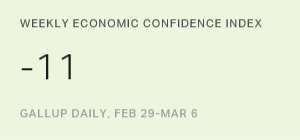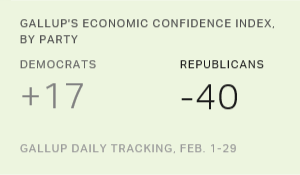Story Highlights
- Economic Confidence Index within range found since July
- Current conditions steady at -4, economic outlook flat at -18
WASHINGTON, D.C. -- Americans continued to have slightly more negative than positive views of the strength of the U.S. economy last week, resulting in a U.S. Economic Confidence Index score of -11. That is within two points of the weekly readings measured since mid-January, and in line with most averages since July. However, confidence was slightly higher at this time in 2015.

At the beginning of 2015, Americans were relatively upbeat about the economy as gas prices descended. Gallup's Economic Confidence Index reached into positive territory during this period, including a score of +1 at the beginning of March 2015. Gas prices then started rising, and economic confidence started falling. In late August, with China's weakening economy contributing to a week of severe U.S. stock market volatility, the index dipped to -17. Since then, the index has been stable, mainly remaining within the narrow window of -15 to -10, with the exception of a brief rise to -7 following President Barack Obama's last State of the Union address.
Gallup's Economic Confidence Index is the average of two components: how U.S. adults rate current economic conditions and whether they say the economy is getting better or getting worse. The theoretical maximum of the index is +100, if all Americans rated the economy well and getting better, and it has a theoretical minimum of -100, if all U.S. adults rated the economy poorly and getting worse.
For the week ending March 6, 25% of U.S. adults rated the economy as "excellent" or "good," while 29% rated it as "poor." This resulted in a current conditions score of -4, consistent with scores found over the past few months.
Since last March, Americans have consistently rated current economic conditions more positively than the direction of the economy, and the most recent week is no exception. The economic outlook score of -18 is the result of 38% of U.S. adults saying the economy is "getting better" while 56% say it is "getting worse." The economic outlook score is consistent with where it has been for the past few weeks.

Bottom Line
While the February jobs report, released on March 4, showed strong hiring and continued low unemployment in February, U.S. adults continue to give the economy mixed reviews.
Gallup's Economic Confidence Index has been stable for the past several months, indicating that Americans may need more drastic changes in the economy itself for their views to change. This is especially true in a presidential election year, in which Americans are getting different views of the health of the U.S. economy from the candidates of the two political parties. Republican candidates have generally emphasized weaknesses in the economy, such as sluggish economic growth, growing inequality and wage stagnation. While Democratic candidates are more likely to tout the economic progress that has been made under Obama, they are also sensitive and do not argue there are no economic problems that need fixing should they become president.
These data are available in Gallup Analytics.
Survey Methods
Results for this Gallup poll are based on telephone interviews conducted Feb. 29-March 6, 2016, on the Gallup U.S. Daily survey, with a random sample of 3,559 adults, aged 18 and older, living in all 50 U.S. states and the District of Columbia. For results based on the total sample of national adults, the margin of sampling error is ±2 percentage points at the 95% confidence level. All reported margins of sampling error include computed design effects for weighting.
Each sample of national adults includes a minimum quota of 60% cellphone respondents and 40% landline respondents, with additional minimum quotas by time zone within region. Landline and cellular telephone numbers are selected using random-digit-dial methods.
Learn more about how Gallup Daily tracking works.




